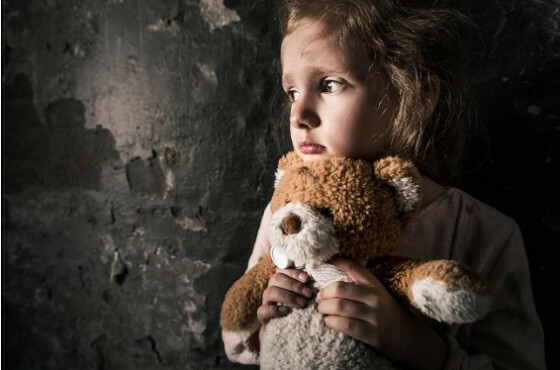Sexual abuse in childhood: when we were dead
This article wants to be the beginning of a series of reflections on this scourge that plagues us and at the same time a tribute and dignity for all those people who have suffered in their flesh the pain, confusion and silence that surrounds this phenomenon so abundant in our society, such as a stranger.
Indeed, It is estimated that one in five boys or girls (much more common in girls) has been the object of sexual abuse in childhood, clearly prevailing intrafamily abuse. According to data from the ANAR foundation, the figure of the father still predominates among the aggressors, reaching 32% the number of cases where the aggressor is the male parent.
We reiterate that we do not want to refer to theoretical studies on causes and consequences of sexual abuse in childhood, but we want to put ourselves in the role of the victim and reflect from their own skin. This series of articles is the result of years of therapy with people who have suffered abuse of all ages and wants to give voice and feeling to their experience and their suffering.
That is why we will begin by reflecting on what I call “the fog”, drawing inspiration from the title of the book by Joan Montané and collaborators, “When we were dead”. Like so many other mistreatments suffered in childhood, the victim remembers what happened in a confused, foggy way or does not remember directly.
- Related article: "Trauma and neuromodulation"
The "fog" of child abuse
The first act of respect with a person who has experienced sexual abuse in childhood is to understand, to understand that the first person who does not understand or understand is the victim himself. And what "adult" and brainy phrases of the type, "she's not sure what happened!", "Why didn't she tell it before?", "Children make up a lot of things!"... they are the definitive slab in the psychological and moral coffin in which the abused lives.
The first person who doubts, who blames himself for not having defended himself, for not having told him, is the same victim. The memory, if there is one, I repeat, is hazy, where many times only the sensation is remembered, not so much the facts, and many times, simply, nothing is remembered.
As with other types of trauma, the person can and does forget the abuse. The brain, through an effective defense system, "dissociates", "disconnects" from what happened in different ways.
On many occasions, they can recall the smell, atmosphere, or sounds of when the abuse occurred and be unable to recall the images of the same, or vice versa, to be able to recognize the feelings experienced at that moment, but not the exact events that provoked. We can also find cases where the clear memory of telling someone close to him what the abuser did to him appears, and yet not having any direct memory of living with him.
The child's brain turns off to avoid pain. Faced with prolonged helplessness, the vagus dorsal system is activated, which sets in motion the immobilization and freezing process, leading to an experience where behavior is dissociated from emotion. This dissociative mechanism allows to continue surviving in contact with the abuser.
The child, depending on the age, with greater or lesser intensity and with greater or lesser confusion, is born to sexual, genital activation, in an age in which either he has not developed sufficiently biologically, or he is not fully certain of what he is happening. Let us bear in mind that the abuser is almost always a figure of descent, often emotional, for the child.

- You may be interested in: "Affection, interaction and movement: keys in development"
The problematic management of discomfort
Affection, bond, attachment, sexual activation, sensory overflow... everything is intertwined, all of this is very difficult to organize, especially when it does not seem to happen and nobody talks about it.
That person, the abuser, is supposedly protective and actually thinks he or she loves the child, so it is understandable that this child does not want to lose that affection, that attachment, that bond; so that what happens "is not bad" even though there are times when the victim comes to feel it as bad. Or, put another way, if it is something bad, not adequate, it is not possible that the "bad" or "terrible" is the adult figure. That is, the only plausible explanation for the child's mind is that the "bad guy" or "the one who causes that badness" is himself.
In our extensive experience, in the absolute majority of cases of child abuse, the victim, when he begins to glimpse the lived experience, is perceived as guilty, as responsible.
To this we have to add the answers, on many occasions disappointing, from the mother, or the father or the grandparent when the child tells what a member of the same or close family does to them affectively. They tend to neglect, ignore the message received, forget the crime heard. Either because it is intolerable to assume the child's pain, look at oneself and assume the lack of vision or because the good of the family institution predominates, and finally, “children's things” are used, “it is impossible"... with which the victim internalizes the fact that telling what happens endangers the family structure or destroys a family member in the close social environment.
M. J. Horowitz goes so far as to affirm that one of the reasons for the unconscious forgetting of the memories of abuse has to do nothing less that with the "preservation of the love of others", either of the person to whom it is told or of the person who perpetrates the abuse.
Let's imagine the “haze” of confusion in which the child lives and that will be prolonged by adding magical, dysfunctional explanations and always nullifying and devaluing for the rest of his life. We will continue reflecting and delving into this issue in future articles.
Author: Javier Elcarte, trauma psychologist. Founder and director of Vitaliza.



